Here is the first question: Why is Sophie Hannah writing the new Poirot novels?
For many of you, the real question is why anyone should endeavor to continue Hercule Poirot’s career forty-five years after his true creator’s death? It’s a good question, but it’s not my question. Notice the italics on the name “Sophie Hannah.” It isn’t the act of continuing Christie that I wholly object to; it’s the person that the Christie estate has assigned to the job.
Just this past week, over at the Agatha Christie Appreciation page on Facebook, fans of the Dame got into an argument over Sophie Hannah that was much more “rock ‘em, sock ‘em” than usual. If there is one thing I have come to learn in spades since becoming a blogger, it’s that the term “Agatha Christie fan” covers a wide base! There are folks like me who began reading the author when she was still alive and publishing, who still remember “a Christie for Christmas,” who sat open-mouthed with horror in a movie theatre when The Alphabet Murders actually slaughtered an Agatha Christie novel, who were mildly bemused at Dahlia Lavi playing Emily Brent in the film Ten Little Indians, who started to breathe easier when Sidney Lumet directed Orient Express. Many fans of this type consider themselves purists, who wince at the liberties some of the film and TV adaptations have taken and who balk at the idea of Sophie Hannah – or anyone for that matter – having the gall to take up their pen and recreate Poirot in “new” old adventures.
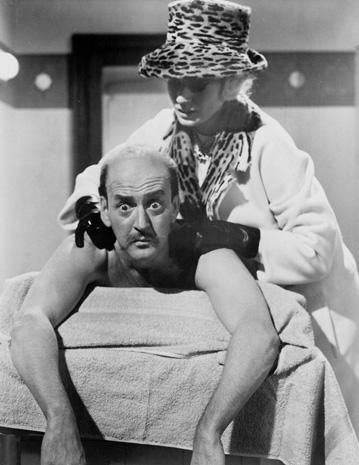 Poirot? Really?????
Poirot? Really?????
But I’m only 87% purist. To be honest, having read every novel and, with the exception of three titles, having read them multiple times, I miss the little Belgian – and the woolly spinster and even, on occasion, the feckless couple who dabble in spying. I have all of the books, some in multiple copies. I own most of the novels and stories in audio form so that I can listen to them in the car. I own most of the screen adaptations – well, not the recent BBC travesties. I pretty much know my Christie backwards and forwards, so if someone wants to try their hand at continuing the history of these iconic sleuths, I am open to a talented writer trying her or his hand at it.
If you have read Mark Aldridge’s book, Agatha Christie on Screen, or have looked at the reviews on Amazon for any of Hannah’s three continuation novels, you will learn about another kind of fan:
“ . . . Many people’s first experience of Agatha Christie is not through her original texts, but through adaptations of her work for film and television. Indeed, while I was writing this book, several acquaintances have declared themselves to be fans of Christie, only to confess later that they have actually never read a single one of her published works.” (Aldridge)
In these days of massive bookstore closures and libraries crowded with children playing video games on the computers while the bookshelves gather dust, one can understand this phenomenon. Yet I admit it’s a hard pill to swallow. My Facebook friend Scott Wallace Baker made an interesting comment in our group’s conversation about the Hannah books. (I’m sorry I can’t quote him verbatim: the discussion took a fractious turn, and I’m thinking it might have been taken down.) In essence, he said that the continuation novels were approved by the Christie estate to make Dame Agatha’s name popular with modern audiences by attaching her legacy to a modern author. Nobody opined that Christie would be better off forgotten, but after three such continuation novels, the question hasto arise: is the right author doing the job?
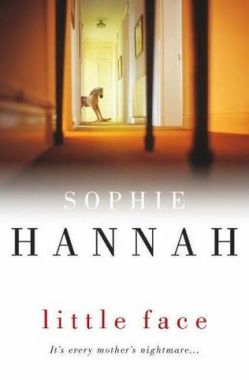
I think Sophie Hannah is a good writer . . . of psychological thrillers. I read Little Face, her first book in the Zailer and Waterhouse series. Great hook, good characters, and an ending that was . . . a bit disappointing.
I know that Sophie Hannah is a great fan of Christie because . . . she has told us many times:
“Agatha is part of my literary DNA. I’m a different kind of writer, stylistically, but she is undoubtedly my biggest influence. Her work taught me that a strong plot is the key to character because we only stand a chance of understanding and knowing a person once we know what they did and why.”
Hannah gets special points because she and I share a special love for After the Funeral. I’ll grant that the woman’s got taste. But does she have the chops to write a Christie novel? After reading The Monogram Murders, Closed Casket, and now The Mystery of Three Quarters. . . I fear, decidedly, that she does not.
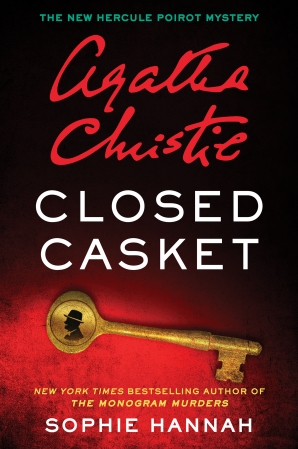
Here I offer some thoughts on The Mystery of Three Quarters, told through five reasons why Hannah should stop writing Poirot books.
One: Christie knew how to hook her audience in, but Hannah does not understand the Christie hook.
Mind you, Hannah knows how to start a novel with a bang. I mentioned Little Face above: a woman comes home, checks in on her sleeping baby – and rushes out of the room announcing that the infant in the crib is not her son! Her husband, her mother-in-law, her friends all disagree. Is she delusional? (Hint: if she is, we’re not reading a mystery!)
But Hannah does not know her way around a classic mystery hook. Of her three Poirot stories, Three Quarters has probably the best hook so far: Poirot comes home to his flat to be bombarded in turn by four people who have received a letter, ostensibly from the great sleuth, accusing them of having murdered an old man whose death months before had been ruled an accident. This actually bears some resemblance to After the Funeral, where a family is forced to review the seemingly natural death of the paterfamilias due to an awkward comment made at his funeral by an awkward relative – who is then awkwardly bumped off.
The letters certainly get Poirot involved right away, but there is something not . . . rightabout this whole set-up. The sleuth himself asks the question constantly: why these four? Why this way? That question is answered in the end, and while I promise there will be no spoilers here, the answer is unsatisfactory.
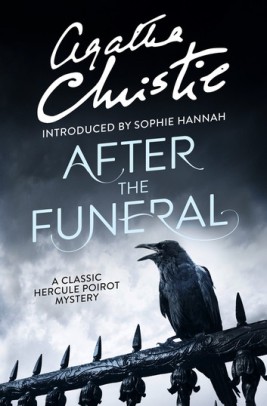
Two: Christie had a way of using a few strokes of her pen to delineate place and social milieu. She also knew how to write servants, children, and dogs. Hannah chooses not to do the first and seems incapable of accomplishing the second.
I don’t know why, but Sophie Hannah continues to refuse to give us any sense of when these novels are taking place. I would hazard a guess that given the absence of Hastings, coupled with the fame Poirot enjoys, we can place these cases in the mid to late 1930’s. However, I had heard that these are supposed to take place in the 1920’s. No matter! Hannah offers virtually no details of dress, place or background events that would give us a clue about this. The sense of class is confusing here. The first character we meet is introduced as an upper-class snob but turns out to be a very different sort of person. It only serves to remind me how underrated Christie has always been in how well she does this.
You want interesting and enjoyable children? I direct you to Peter Carmody in The Body in the Library, to Josephine Leonides in Crooked House, to Alexander Eastley and James Stoddart-West in 4:50 From Paddington. The main teenage boy in Three Quarters in no way speaks or acts like a child. In fact, his schoolmaster is portrayed as more convincingly childlike. And the dog . . . well, say what you like about Bob in Dumb Witness, but the part he plays in solving the case makes sense. The best you can say about the Airedale terrier here is that 1) he’s loyal, and 2) one can only wish he would get away from these nutty people.
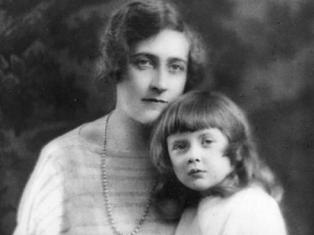
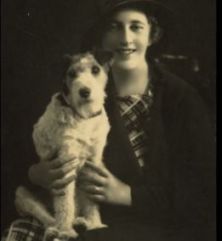
Three: Hannah stated the lesson: “(Christie’s) work taught me that a strong plot is the key to character . . .,” but she has not mastered it.
Christie’s killers are clever people. I can even think of three “stupid” murderers who bedevil Poirot with their daring moves. More impressively, it is in her presentation of characterization that Christie often supplies us with the best hidden clues to a killer’s identity. In all the first and second tier mysteries, the correct solution is the only solution imaginable – once you understand the true nature of a character. Consequently, for me the weakest mysteries are those where we don’t really have a hope of seeing through a person’s mask. Books like One, Two, Buckle My Shoe and Dead Man’s Folly have that slight taint, in my opinion. Usually, however, Christie’s ability to “hide in plain sight” the clues you need to solve the case is a hallmark of her greatness.
Hannah does not possess this ability. Her characters don’t work: their names, their personalities, and their actions do not ring true within the confines of a Golden Age-style mystery. Nowhere is this truer than in her depiction of the Great Man himself. Her Poirot is too unsure, too bent on psychologizing, and not good enough at those moment to moment deductions that propel him forward in a case. Here, the sleuth gives himself a deadline for gathering the suspects and revealing the solution, taking the step of inviting everyone to a certain place for the “big reveal.” And yet, until near the very end, Poirot has no idea what is going on and constantly lets the reader know this.
Almost as bad is Hannah’s version of Hastings, Scotland Yard Inspector Edward Catchpool. He has always been a strange companion for Poirot; here he is merely superfluous. In a weird narrative choice, Hannah tells the story in multiple voices: first person for Catchpool, third person omniscient for certain of the characters, and then in a very intimate third person – too intimate, in fact – for Poirot. This time around, however, Catchpool does little to help Poirot and is, more often than not, not even present to provide an ear for Poirot to show off his greatness.
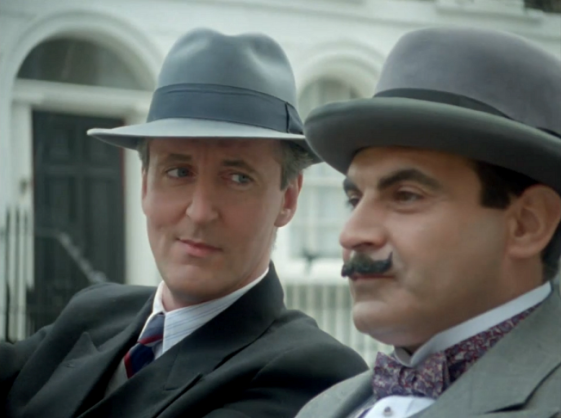 Where is a good Watson when you need one?
Where is a good Watson when you need one?
Four: The journey from hook to denouement in a Christie novel is a series of scenes that obfuscate in the most entertaining of fashions. The dropping of clues is done with the mastery of a true “Queen of Crime.” That doesn’t happen here.
If Hannah’s hooks are not true Christie, a bigger problem is with the vast middle, which sags badly. There are many characters here, and they’re just . . . weird. Their conversations with Poirot are syntactically odd, resembling the work of a new self-published author trying to tell-not-show characterization and to cram “hidden” clues down our throats. These folks act like nobody would act, just because the plot demands they do certain things, like leave the front door of a mansion ajar at all times so that the family dog – and perhaps a murderer – can get in or out at will.
Clearly, Hannah is a fan of the psychological novel; her best work attests to that. But Christie’s use of psychology was always subtler and richer than what we find here. Often Poirot sounds like a crackpot therapist trying to explain to a character his or her neurosis:
“(Poirot) had not intended to make a sound, but was relieved to have worked out what it was about Annabel Treadway that had struck him: had to determinedly pushed her own emotions to one side in order to think only about her sister’s.
“’Yes, that is it,’ thought Poirot to himself with satisfaction. Both of the sisters had been so acutely aware of the other, so attuned to every word, expression or gesture coming from the other . . . Why? He asked himself. It was as if Lenore had placed Annabel – and Annabel in turn had placed Lenore – under a form of secret surveillance.”
In the canon, Poirot has been known to lay traps for killers or to play tricks to prove a point. Late in this novel, he does something so cruelly awful to a character – and he does it with a wink – in order to test a theory that really has nothing to do with this character in the least but with human nature in general. It’s a truly nasty moment that Christie, despite her own antipathy for the detective she had created, would never have thought to allow Poirot to do.
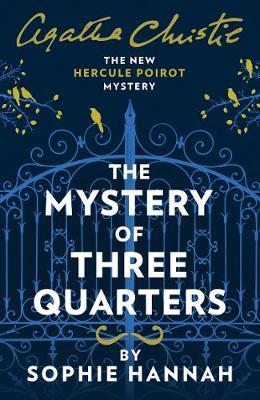
Five: In most cases, Agatha Christie led us brilliantly down the garden path to a denouement that was surprising and satisfying, a perfect confluence of who, how, and why. Do not look for that here!
In the interests of fairness, I want to share a positive review of the ending of Three Quarters that I found on Amazon:
“In a scene that nearly rivals possibly the greatest reveal of all time from MURDER ON THE ORIENT EXPRESS, Poirot invites every person now involved in the case, and a few extended relatives, to a room at Combingham Hall where he promises to resolve everything. It’s much more than merely typewriters with a faulty letter “e” or phony letters at this point. What Hannah skillfully devises is a Hercule Poirot reveal that runs for over 40 pages and is so absolutely riveting that readers almost will be able to hear the air escaping from the room that has become his stage for the final act.”
The only thing I agree with here is that the explanation “runs for over 40 pages.” To me, it seemed like 80, and it laid out a plot that was so . . . well, even in her final years, Christie would not have made us settle for a solution like this. The motive alone for the killer’s actions is ludicrous, and the ensuing scheme is utterly ridiculous. This continues a pattern I found in the first two Hannah/Christie novels, but here it was especially off-putting to me.
In conclusion, what seems effortless to Christie is a grinding mess of gears and machine parts that don’t quite fit in. The title alone seems so off to me. I’m sure it’s hard to come up with a good one! Goodness knows, some of Christie’s titles possess two or even three titles. Nobody said titling a novel would be a piece of cake, but when a book is actually named for a piece of cake . . . I leave it to you to judge.
I want to reiterate that I still do not object to somebody trying their hand at continuing the adventures of Christie’s iconic sleuths. Hell, we’ve been treated to hundreds of “new” Holmes stories over the past hundred years, and some of them are damn good! But if Hannah is wrong for the job, where is a true Christie fan to turn?
Tune in for my second question to find out.
You’ve summed up my thoughts on the first two books perfectly, Brad.
The best (i.e. most) of Christine’s plots baffle the reader until a single line from the sleuth turns the whole thing upside down and makes most of it clear to the reader who has been paying attention. A single line, not over 10% of the narrative…
LikeLiked by 2 people
Exactly, PD! Those who complain about Christie’ “economy of style” need only read Hannah’s version to appreciate the superiority of the reader. Interestingly, the Guardian called Hannah a “better” writer who misses the mark by not capturing Christie’s “simplicity.”
LikeLike
That’s hilarious.
Simple is hard. Christie is an very efficient writer.
LikeLiked by 1 person
Sorry to hear this. I’ve only read the first one, which didn’t impress much, but there was always hope that Hannah would improve. Unfortunately, from what you tell us, this does not seem to be the case – the author seems bent on bending Poirot into the kind of character that she wants to write, instead of the other way around. Ah well, I’m sure I’ll pick them up at some future point in time anyway.
LikeLiked by 1 person
I guess that one of these days the true Christie fans will all be gone, and none of this will matter. I know that sounds melancholy, but I’ve just read this book . . .
LikeLike
You touched a nerve here, Brad. I am not at all a fan of add-ons like that, no matter who writes them. And, much as I respect Ms. Hannah’s writing talent, the same is emphatically true of her Poirot novels. Just… no.
LikeLiked by 1 person
Margot, I do think Hannah writes her own novels well. But if, as some have stated on Facebook, the reason for these novels is to preserve the copyright on the Poirot character, then it really doesn’t matter whether she writes these “well” or not!
LikeLiked by 1 person
My thoughts exactly. A plot and the solution need to be elegant, one flowing almost effortlessly into the other.
I reviewed ‘Death Knocks Twice’ by Robert Thorogood (See here: http://fred-de-vries.blogspot.com/2018/06/review-death-knocks-twice-by-robert.html) and it had the same problems. Too complicated a plot and thus he needed 60 pages to explain what had happened.
Why did the estate choose Hannah? We shall probably never know, but in hindsight.it was the wrong decision.
LikeLike
Fred, my guess is that Hannah is a successful mystery author on both sides of the Atlantic. Her name on the cover right under Christie’s would probably guarantee numerous readers who follow Hannah and, perhaps, not Christie. The goal, as I understand it, is to keep the Christie name alive and popular. Readers new to Christie would most likely not register the same complaints I have here.
LikeLike
So, you hated the first one, hated the second one, hated the third one…so in about another seven or eight you’ll be ready to give up on them, right? 🤣
LikeLiked by 2 people
I don’t have time to consider your point, Jay Jay, as I’m putting the finishing touches on my authorized biography of Paul Halter for delivery to Simon and Schuster! Hope you’ll buy a copy!
LikeLike
I think Hannah’s being such a vocal mystery fan surely helped her get the gig! It’s sad to me that such an undoubted fan like Hannah has proven so unsuitable for the job, but her verbose, overly detailed, “psychological” crime writing is all wrong for Christie. Christie just didn’t write like this, except in her later books, when he discipline was breaking down or when she was trying something new, like Endless Night. (That is like a Hannah book.) Hannah is nothing like GA Christie. Martin Edwards would have been a better choice, but perhaps asking a man to do it would have been considered a sexist jab. the best Christie pastiche I’ve read was by HRF Keating. But Hannah’s books aren’t pastiches.They are Hannah novels with Poirot in them.
LikeLiked by 2 people
Yeah, being a vocal proponent of someone or something never hurt: I seem to remember Jeffery Deaver getting the job writing a new Bond novel because when he received an award he talked about how much of an influence Fleming had been on his own writing and the estate approached him as a result. And Deaver’s Carte Blanche (that’s the title of the book, not some comment on the writing process) was probably the worst Bond novel yet written — to take Curtis’ phrase above, very much a Jeffery Deaver thriller with a character called James Bond in it.
In that case, allow me to say how much I love the novels of Agatha Christie, and I throw my hat into the ring to be paid a lot of money to write something no-one will like: at least that way I’ll re-unite readers old and new around a common opinion…!
LikeLiked by 1 person
Guess who has an audiobook version of this already downloaded 🙃.
Sophie Hannah can’t write like Christie and can’t plot like Christie, that’s really what my reasons for disliking the continuation novels boil down too.
However, I love torturing myself ( or hating novels. Hard to tell) and will dive into this soon enough, I’ll have a copy of After The Funeral ready at hand for when I emerge from that dark abyss and am in need of some support.
LikeLiked by 1 person
Let AtF be a balm when times get hard, Bekir.
LikeLiked by 1 person
I agree that Sophie Hannah was a poor choice. Much better choices are Anthony Horowitz or Christopher Huang. Even Bradley Friedman is a better choice !
LikeLiked by 1 person
I don’t have your long-standing pedigree as a Christie fan, Brad, but I can be quite the purist when it comes to pastiches and everything about this continuation repels me away from them. Sadly, they appear to be popular with a lot of readers and The Mystery of Three Quarters has a ton of four-and five star reviews. And that makes me shudder to think what the future has in store for Miss Marple, Harley Quin, Tommy and Tuppence.
I don’t believe Hannah only got this gig because she has been a vocal fan of Christie. Remember those reprints that used a large font to bloat the page-count and had those dark, moody covers resembling a P.D. James novel? This is just another one of those attempts to “update” her work.
LikeLike
As for Our Sophie, what strikes me (I admit I only read Closed Casket, which was enough) is that in Hannah’s hands Poirot doesn’t need to be Poirot at all. As an example, the Robert Goldsborough books, while paling when inevitably compared to Rex Stout’s originals, still tell Nero Wolfe-Archie Goodwin stories, and get the tone and relationship mostly right. The Wolfian world, in other words, is simulated and reflected.
In these new incarnations, Poirot carries little that makes him Poirot, and I thought that he could easily be rechristened Dalloway or LeFevre or whatever and the book would remain the same, with no vacuum created. I didn’t think Closed Casket provided much of a Christie world at all, not in clueing or setting or dialogue or demeanor. Forgive the grumpiness, but a year later the “New Poirot Mystery” still rankles in memory. Best wishes and thank you for your always thoughtful and engaging posts! You’ve gained a fan, even if another author hasn’t…
LikeLiked by 2 people
Devil’s advocate moment. Bear with me.
I really get tired of reading how untouchable and inimitable Christie is as a plot technician and “imagineer” of detective writing. There are plenty of writers who have outshone her over time. Read enough of mystery fiction and you’ll uncover dozens of books in which her clever plots were already written — decades before she thought them up. The Invisible Host, The Clue in the Air, The Bellamy Trial nearly everything Oppenheim wrote…. She wasn’t as brilliantly original as everyone thinks she was. Hannah is trying to imitate her idol, but apparently cannot. So what? Amelia Reynolds Long tried desperately to imitate her idol Christie back in the 1940s and 1950s and failed too. In Amelia’s case a miserable unintentionally laughable failure. I think this is usually the case with creative people who revere their heroes and then try to replicate or attempt to at least match their hero’s work. It’s the old Peter Principle at work coupled with a kind of built-in Murphy’s Law.
I know for certain you don’t think the writer to carry on the Christie tradition should be Andrew Wilson. After reading JJ’s typically overly-analytical diatribe and your own indifferent reaction to A DIFFERENT KIND OF EVIL I rolled my eyes and moved on.
LikeLike
If I thought Christie was the only one who could do this thing well, I’d have been done with the genre a long time ago, John. I write about her a lot because I know her work best
of all the GAD novelists I’ve read and I’m not interested in just writing reviews. However, I am well aware that Christie didn’t invent the narrator-as-murderer or the secluded place where people die one by one. Her prose is simple and not very rich, and she wrote some bad books – as anyone with a prolific career will.
I probably couldn’t have as strong an opinion about Stella Duffy or Robert Goldsborough because I claim no expertise over Marsh
or Stout. I just have a strong opinion about how someone chose to “continue” Christie. More strong opinions are coming!!!
That does not extend to Andrew Wilson, however. It was clear from the start that Wilson was creating a story about Agatha and not trying to emulate the author. I just didn’t feel inspired to read it after the first page. I didn’t mean to make it sound dismissive. I think JJ liked the book!
LikeLiked by 1 person
Pingback: TWO REVIEWS, TWO QUESTIONS: Part Two | ahsweetmysteryblog
A thought on why these books are apparently selling – not why they exist, that’s been covered already, but why people are buying them and where those four and five star reviews come from.
Remember the primary place where the man in the street encounters Agatha these days is on television and film. And then try and remember the last faithful adaptation… go on, I’ll wait…
Presumably it’s one of the mid-series Suchet books. The later ones of that series, the Marple episodes, the recent BBC adaptations, all of them have been layered with extra subplots, character issues and nonsense plot changes that Dame Agatha would never have considered. And yet people watch them. So there are a number of people who feel they know the Christie Poirot canon because they’ve seen it on the telly and don’t feel inclined to go back original source, but read something new. And because they haven’t read the original, they don’t know any different and think this is a classic Christie style.
I’ve seen it in newspaper reviews, describing Monogram and Casket as classic Christie – they clearly hadn’t read any classic Christie, at least not recently, and I think a lot of the new readers haven’t either…
LikeLiked by 2 people
All you say is true. The latest Hannah/Christie has a scene where a man wakes up in bed with a prostitute. One of the characters is a secret abortionist, and this is bandied about with all the subtlety of a Trump rally. Just like Sarah Phelps, Hannah is “adapting” Christie for modern audiences. No, thanks!
LikeLike
Wonderful post! If they want a new generation to read Christie republish her originals with new covers that would reflect this generation. Reading the ‘new’ Poirot is not reading Christie. It’s reading Sophie Hannah.
LikeLiked by 2 people
Bingo, Peggy! I love the “generational” covers on paperbacks!
LikeLiked by 1 person
Brutal but absolutely right. I can understand why the estate wanted to continue the character but a disciple of Ruth Rendell’s work was never going to be right. Elly Griffiths should have been given the gig
LikeLike
While it’s obvious now that I voted for Anthony Horowitz, Curtis Evans made a comment that resonated with me. It makes sense for a current Crime Queen to take on the greatest of all. I’ve only read one of Griffiths’ magician series, but she certainly captured the vintage atmosphere and delved in whodunnit territory rather than the realm of psychological suspense.
LikeLike